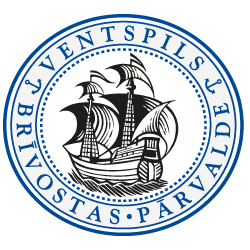- Board
- Administration
- Legal Basis and Functions
- Financial Information
- EU Projects
- Renovation of the Ventspils Freeport Vessel Traffic Management Centre and Electrification of Berths
- Digital Transformation of Port Management through Enhanced Processing and Analysis of Transport and Logistics Data
- H2-Derivatives@BalticSeaPorts
- “MarTe” Project Partners in Ventspils Explore Regional Opportunities for Strengthening the Blue Economy
- Project FVA/Remediation of historically contaminated sites
- Project Reconstruction and Renovation of Waterside Structures at the Freeport of Ventspils
- Project Industrial Heritage
- Development of accessroads to terminals and industrial areas at the freeport of Ventspils
- Construction of production plant no.6 in the Ventspils High Technology park
- Construction of Electronics Centre Production Facility in Ventspils
- Construction of Technology Center Production Facility in Ventspils
- Reinforcing of piers number 2 and 3 on VENTA river embankment
- Access Roads to Terminals and Industrial Zones Located at the Freeport of Ventspils Territory
- Infrastructure development at the Freeport of Ventspils
- Amber Coast Logistics
- Construction of Dry Cargo Terminal at the Freeport of Ventspils
- Space Technologies and Services Cluster Development 2012-2015
- Acquiring Foreign Markets – External Marketing
- Drone Piloting
- Documents and Publications
- Contact Us
H2-Derivatives@BalticSeaPorts

The project H2-Derivatives@BalticSeaPorts (H2Deri@BSP) aims to develop appropriate strategies that will enable the participating ports to timely transform into green energy hubs and contribute to reducing CO₂ emissions in the Baltic Sea Region, including:
- Exchange experience and enhance knowledge and competence among Baltic Sea Region port authorities and stakeholders to ensure qualified and sustainable handling and bunkering of hydrogen (H₂) derivatives, such as methanol and ammonia,
- Reduce CO₂ emissions from vessels operating in the Baltic Sea by offering zero-CO₂ or low-CO₂ ship fuels in Baltic Sea ports as innovative energy hubs,
- Mitigate the negative impacts of climate change.
The activities of the H2Deri@BSP project focus on developing solutions to prepare Baltic Sea ports for the use of alternative fuels (hydrogen and its derivatives) in the following areas:
- Research and identification of alternative fuel production from renewable energy sources,
- Research on bunkering infrastructure and preparation of related plans,
- Analysis of the alternative fuel market,
- Research on the regulatory framework,
- Development of a communication strategy.
The project involves 15 partners: AS ALEXELA (Tallinn, Estonia), Port of Helsinki Ltd (Helsinki, Finland), Port of Kiel (Kiel, Germany), Freeport of Ventspils Authority (Ventspils, Latvia), Association of German Seaport Operators (Hamburg, Germany), Port of Tallinn (Tallinn, Estonia), Gasum Ltd (Espoo, Finland), Mabanaft GmbH & Co. KG (Hamburg, Germany), Hamburg Port Authority AoR (Hamburg, Germany), Port of Esbjerg (Esbjerg, Denmark), IVL Swedish Environmental Research Institute (Stockholm, Sweden), Lindholmen Science Park AB (Gothenburg, Sweden), Port of Luleå (Luleå, Sweden), Public Limited Liability Company Klaipeda State Seaport Authority (Klaipėda, Lithuania).
The project’s lead partner is Hafen Hamburg Marketing e.V.
Freeport of Ventspils Authority will lead the development of a planning and optimization model, creating scenarios for the development and investment in hydrogen and hydrogen-based sustainable fuel production based on local renewable energy resources.
As an infrastructure hub, the Port of Ventspils has significant potential to take part in the development of the future hydrogen economy and to become a production and export center for alternative fuels. This would strengthen Ventspils’ position as a sustainable energy solutions hub in the Baltic Region, supporting the transformation from a fossil energy port to a renewable energy port.
The project H2-Derivatives@BalticSeaPorts is funded by the Interreg Baltic Sea Region Programme 2021–2027 with the co-funding of the European Union. The total project budget amounts to EUR 2,858,359.20, of which EUR 2,286,687.36 is co-funded by the European Regional Development Fund, and EUR 571,671.84 is co-funding of project partners. The project implementation period runs until 29 February 2028.
More information: www.interreg-baltic.eu/project/h2deribsp/
News:
